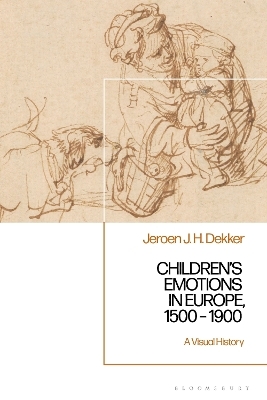
Children’s Emotions in Europe, 1500 – 1900
Bloomsbury Academic (Verlag)
978-1-350-15070-6 (ISBN)
Jeroen Dekker observes children’s emotions mainly in the child’s world and in the domestic emotional space, and connects them with history’s ongoing, underlying discourse on education and the emotions. This discourse was developed by theologians, philosophers, and moralists like Augustine, Aquinas, Erasmus, Descartes, Jacob Cats, John Locke and Jean-Jacques Rousseau, by Romantic educationalists like Friedrich Fröbel and Ellen Key, and by scientists like Charles Darwin and William James who emphasized the biological instead of the moral fundament of children’s emotions.
The story of children’s emotions is told in the context of cultural movements like the Renaissance, Humanism, the Reformation, the Enlightenment, Romanticism, and the starting Age of Child Science. Children’s Emotions in Europe, 1500 – 1900 crucially highlights the continuous co-existence of regulation-oriented and child-oriented educational views on children’s emotions.
Jeroen J. H. Dekker is Honorary Professor of History and Philosophy of Education at the University of Groningen, The Netherlands. He was a visiting fellow at the Max Planck Institute for Human Development (Berlin), Columbia University (New York), and the European University Institute (Florence), and is honorary editor of Paedagogica Historica, the (co-)author of fourteen books including The Will to Change the Child (2001), Educational Ambitions in History (2010), and the editor of numerous volumes, such as A Cultural History of Education in the Renaissance (2020).
List of Figures
Acknowledgements
1: The Making of a Visual History of Children’s Emotions in Europe
Part I: Belief in the Child as Animal Educandum: Children’s Emotions in the Age of Renaissance and Reformation
2: The Big Talk on Education and Emotions in the Age of Renaissance and Reformation
3: The Expression of Children’s Emotions in the Age of Renaissance and Reformation
4: The Birth of a Mission: Educating Emotional Literacy in the Age of Renaissance and Reformation
Part II: Between Child and Education: Children’s Emotions in the Age of Enlightenment, Romanticism, and Science
5: The Big Talk on Education and Emotions in the Age of Enlightenment, Romanticism, and Science
6: The Expression of Children’s Emotions in the Age of Enlightenment, Romanticism, and Science
7: Training Children in Emotional Literacy in the Age of Enlightenment, Romanticism, and Science
8: Conclusion: changing discourses, continuing emotions
Notes
Bibliography
Index
| Erscheinungsdatum | 16.04.2024 |
|---|---|
| Zusatzinfo | 65 bw illus |
| Verlagsort | London |
| Sprache | englisch |
| Maße | 156 x 234 mm |
| Themenwelt | Kunst / Musik / Theater ► Kunstgeschichte / Kunststile |
| Geisteswissenschaften ► Geschichte ► Regional- / Ländergeschichte | |
| Sozialwissenschaften ► Pädagogik ► Allgemeines / Lexika | |
| ISBN-10 | 1-350-15070-3 / 1350150703 |
| ISBN-13 | 978-1-350-15070-6 / 9781350150706 |
| Zustand | Neuware |
| Informationen gemäß Produktsicherheitsverordnung (GPSR) | |
| Haben Sie eine Frage zum Produkt? |
aus dem Bereich


